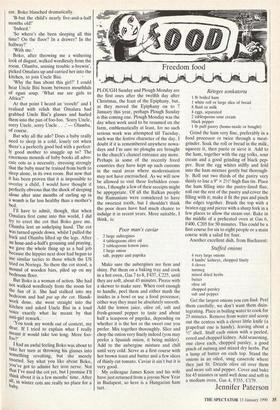Freedom food
PLOUGH Sunday and Plough Monday are the first ones after the twelfth day after Christmas, the feast of the Epiphany, but, as they moved the Epiphany on to 7 January this year, perhaps Plough Sunday is this coming one. Plough Monday was the day when work used to be resumed on the farm, emblematically at least, for no such serious work was attempted till Tuesday, such was the festive character of the day. I doubt if it is remembered anywhere nowa- days and I'm sure no ploughs are brought to the church's chancel entrance any more. Perhaps in some of the recently freed countries they have kept up such customs in the rural areas where modernisation may not have encroached. As we will now be allowed to visit these forbidden coun- tries, I thought a few of their receipts might be appropriate. Of all the Balkan people the Rumanians were considered to have the sweetest tooth, but I shouldn't think the poor dears have had much chance to indulge it in recent years. More suitable, I think, is:
Poor man's caviar
2 large aubergines 4 tablespoons olive oil 2 tablespoons lemon juice 1 large onion salt, pepper and paprika
Make sure the aubergines are firm and shiny. Put them on a baking tray and cook in a hot oven, Gas 7 to 8, F437, C225, until they are soft, about 45 minutes. Pierce with a skewer to make sure. When cool enough to handle, peel them and either mash the insides in a bowl or use a food processor; either way they must be absolutely smooth. Add the lemon juice, olive oil, salt and fresh-ground pepper to taste and about half a teaspoon of paprika, depending on whether it is the hot or the sweet one you prefer. Mix together thoroughly. Slice and chop the onion very finely indeed (you may prefer a Spanish onion, it being milder). Add to the aubergine mixture and chill until very cold. Serve as a first course with hot brown toast and butter and a few slices of thinly cut tomato. Caviar it ain't but it is very good.
My colleague James Knox and his wife have just returned from a joyous New Year in Budapest, so here is a Hungarian ham tart.
Reteges sonkatorta
1 lb boiled ham 1 white roll or large slice of bread 8 fluid oz milk 4 eggs, separated 2 tablespoons sour cream black pepper 1 lb puff pastry (home-made or bought)
Grind the ham very fine, preferably in a food processor or twice through a meat- grinder. Soak the roll or bread in the milk, squeeze it, then purée or sieve it. Add to the ham, together with the egg yolks, sour cream and a good grinding of black pep- per. Beat the egg whites stiffly and fold into the ham mixture gently but thorough- ly. Roll out two thirds of the pastry very thinly to line a 9" x 21/2"-high flan tin. Place the ham filling into the pastry-lined flan, roll out the rest of the pastry and cover the filling with it; make it fit the pan and pinch the edges together. Brush the top with a beaten egg and pierce with a sharp fork in a few places to allow the steam out. Bake in the middle of a preheated oven at Gas 6, F400, C205 for 50 minutes. This could be a first course for six to eight people or a main course with a salad for four.
Another excellent dish, from Bucharest:
Stuffed onions
4 very large onions 4 lambs' kidneys, chopped finely 4 cloves nutmeg mixed dried herbs butter olive oil chopped parsley salt and pepper
Get the largest onions you can find. Peel them carefully, we don't want them disin- tegrating. Place in boiling water to cook for 25 minutes. Remove from water and scoop out the centres with a clever little knife (a grapefruit one is handy), leaving about a 1/2" shell. Stuff each onion with a peeled, cored and chopped kidney. Add seasoning, one clove each, chopped parsley, a good pinch of nutmeg and mixed dry herbs. Put a lump of butter on each top. Stand the onions in an oiled, snug casserole where they just fit. Drizzle olive oil over them and more salt and pepper. Cover and bake for 45 minutes or until well done and soft in a medium oven, Gas 4, F355, C179.
Jennifer Paterson










































 Previous page
Previous page